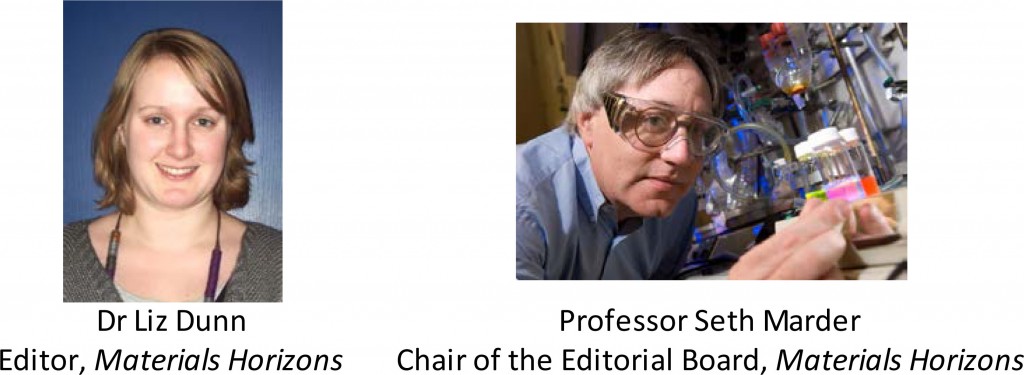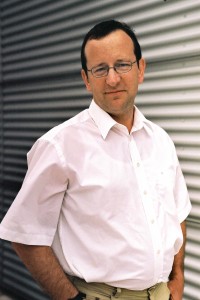Welcome to Materials Horizons, a new materials journal published by the Royal Society of Chemistry. In this Editorial we hope to provide some insight in to the ideas that led to the creation of the journal, a vision of what it could be, and what we expect will distinguish it from other journals. It is worth stating explicitly at the outset that while the Royal Society of Chemistry is a society with the mission to advance excellence in the chemical sciences, the launch of Materials Horizons is not an attempt to create a “chemo-centric” journal. Rather, the Royal Society of Chemistry’s decision to create Materials Horizons was made with a keen recognition that materials research is intrinsically highly multi-disciplinary, and having an extremely high quality society-based journal that embraces this multi-disciplinary nature can be of significant value to our community.
Below we outline some of the principles and values that will drive editorial policy, and describe what we hope the journal will be. Armed with such knowledge, we hope that researchers within the community will develop an understanding and appreciation of the editorial decisions that will lead to acceptance and rejection of papers, and to decisions about which papers may not be sent out for peer review as they don’t fit the goals of the journal (in some such cases, they can be rapidly forwarded to another journal in the Royal Society of Chemistry portfolio for further consideration). Scientific Editors, who are all active researchers in the field, will work closely with the Editorial team to ensure articles meet the stringent criteria required for publication in the journal.
- Materials Horizons is committed to having an editorial process that is fair, transparent and free of bias, while preserving the integrity of the anonymity of the peer review process.
- Materials Horizons will maintain the highest scientific standards in terms of ensuring the materials within the journal are well characterized, that all conclusions are rigorously supported by data that has been collected and whose reproducibility and degree of error have been demonstrated.
- Materials Horizons seeks to strongly emphasize first reports of observations that provide new conceptual insights in the science of materials. In this regard, the scope of Materials Horizons broadly covers all aspects of the field of materials, but the journal is very much focused on the conceptual advances, more than technological improvements. Thus, submissions that report new records for the performance of materials without some significant paradigm shift are not likely to be reviewed, unless the advance in properties on its own is sufficiently great to dramatically shift the field.
- Materials Horizons seeks to publish very concise papers, but recognizes that our field is intrinsically complex and multidisciplinary. For this reason our Communication guidelines call for papers to be 3 pages or less, however it is not our policy that papers must be 3 pages or less. Authors are expected to be concise and to utilize the electronic supplementary information section efficiently, but there is latitude within the editorial policy for longer Communications to be published as warranted.
- A certain amount of speculation will be considered acceptable within papers provided that it is clearly stated as such, distinguished from conclusions based upon data, and that it does not make over-reaching statements about the scientific and technological implications of the work. Put more simply, Materials Horizons seeks to minimize hype.
- The goal of the journal is to maximize its impact, which is distinct from its impact factor. In maximizing impact, we fully expect Materials Horizons will have a high impact factor, but we recognize that historically some of the most important work in science requires time to be fully absorbed and appreciated by the community, and this does not always happen in 24 months or less. Thus we encourage people to challenge the journal with papers that are “ahead of their time”.
Regardless of whether papers are submitted from academic, industrial or government laboratories, authors are strongly encouraged to think about the papers being a vehicle to educate and not simply report information to the community. Thus, we discourage conclusion sections which are simply reiterations of the key results, and require that the conclusions are used rather to detail the insights derived from the work. In a similar manner, Materials Horizons has both Mini-Reviews and Reviews, the guidelines for which can be found on the journal website. Both types of Materials Horizons reviews mean to provide insightful analysis of the work described and not merely to serve as a repository for information gathered from many places. Specifically, we seek to avoid papers that merely provide information as opposed to insight; authors are encouraged to think clearly about the “take home messages” of their papers.
In addition to Communications, Mini-Reviews and Reviews, Materials Horizons will have “Focus Articles”. These articles will largely take the form of editorials and concept pieces (typically invited), to explain or clarify topics in materials. In this regard, our goal is for Materials Horizons to be an educational resource for researchers of all levels.
We hope that we have presented a clear vision what we are trying to create with the launch of Materials Horizons. Ultimately the success and impact of this journal lie in the hands of you the authors, the readers and the reviewers. The editorial team at Materials Horizons is fully committed to make Materials Horizons the premier research and educational journal for this exciting discipline, and we look forward to working with you, and listening to you to make this vision a reality.
Seth & Liz












